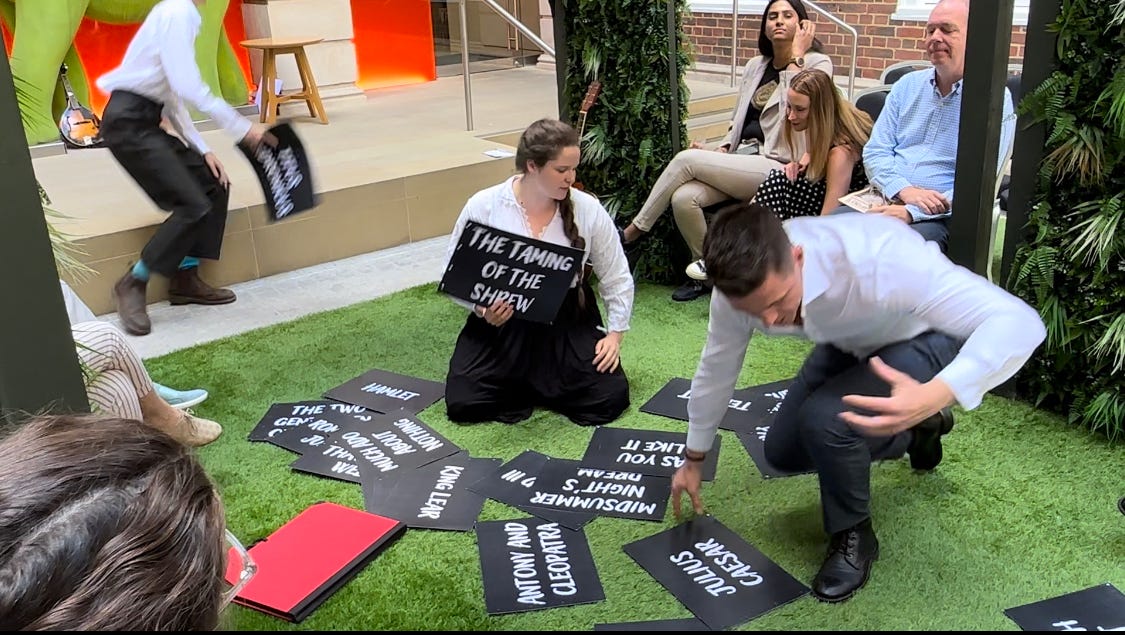Shakespeare's First Folio: why does it matter?
A short history of Jacobean Printing and The First Folio
Today is the marathon day! All the details are on our Crowdfunder page. Please donate if you can, and catch us virtually or in person until 10pm tonight!
While first performing Fix the Folio, the cast and I had the enormous privilege to visit Ruth at the Stationer's Hall archive and hold the Ledger books in which Isaac Jaggard inscribed the copyright of The First Folio on the 8th of November 1623.
There were many forms of printing in Jacobean London. A Folio was the most prestigious, typically produced by printing on larger sheets of paper that were then folded in half. This folding process resulted in two leaves or four pages on each side of the folded sheet.

Quartos (the paper folded into quarters) and octavos (folded to eighths) were also common during the Jacobean era, and cheaper to produce. The choice of book format depended on the content and intended audience of the publication.
Folio books were quite large and the most expensive to produce. The format was principally used for legal documents, religious texts, and scientific treatises. Mr. William Shakespeare's Comedies, Histories, & Tragedies was the first folio ever published in England solely dedicated to plays.
The publication of a book was the Jacobean equivalent of making a Hollywood film. There are many project managers, many editors, and many other departments with differing skill sets. There was no definitive manuscript for the plays produced in The First Folio: printers may have access to the author’s ‘fair copy’, the prompt copy from The Lord Chamberlain’s Men, earlier published copies, and the copy supplied to the censorship department with The Master of Revels. All of which had variations.
Sometimes there wasn’t even that. All’s Well That Ends Well, The Taming of the Shrew, The Comedy of Errors, King John, Henry V, Timon of Athens and Anthony and Cleopatra were all likely printed principally from Shakespeare’s “foul” papers (meaning his own heavily revised drafts).
It would be up to the typesetters to compare the different variations on the shop floor and decide the definitive version and its formatting moments before setting the letters for printing. Let’s not forget the letters for the presses were back to front as well during this process. Just to make things easier.
Printing was not only an expensive gamble, it was a politically risky business. Mr Sparkes in 1630 received permission to print a book on dramatic criticism. The book contained a strident attack on female actors and, unfortunately, was published two weeks after Charles I’s wife Henrietta Maria had taken to the stage. Seeing it as a personal attack the King withdrew printing permission (the ledger entry was scratched out) and both the author and printer were publicly flogged.
Without the risks taken by Edward Blount, Isaac and William Jaggard, John Heminges and Henry Condell we would have lost 18 of Shakespeare’s plays including As You Like It, Twelfth Night, Macbeth and Julius Caesar.
Airless, amazement, assassination, dire, emphasis, eventful, hereditary, impertinent, jovial, lacklustre, meditate, mutiny, pedant, questioning, scuffle, submerged, unreal are all words that make their debut in The First Folio.
The First Folio is second only to The Bible in its impact on the English language and literature... and it’s a book of plays! Now that is something to celebrate.
The last live-streamed performance of tomorrow will be ‘Fix the Folio’ at 21:10. Tune in here.
Todays full programme is:
10:00 Romeo and Juliet
11:25 All’s Well That Ends Well
12:50 Macbeth
14:15 Much Ado About Nothing
15:40 Richard III
17:05 Twelfth Night
18:30 The Merchant of Venice
19:50 A Midsummer Night’s Dream
21:10 Fix the Folio! 36 Plays in 45 Minutes






This a very useful reminder of the importance of the publishers as I visited the Getty Library and saw their First Folio copy